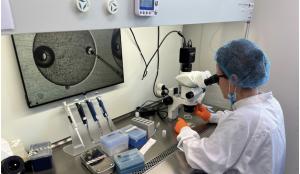Britain says it plans to develop a number of initiatives to help protect the increasingly crowded near-Earth orbital environment.
Its ‘Plan for Space Sustainability’ includes a review of secondary legislation and associated regulations, with a specific focus on orbital constellations which are rapidly changing space environment.
It also places more emphasis on the UK space system licensing process and associated third party liability insurance that will enable safe spacecraft operations and incentivise the sustainable use of space.
“A ‘wild west’ space race without effective regulation risks a growing crisis of debris in space,” said UK science minister George Freeman during the 4th Summit on Space Sustainability in London this week.
“This package of announcements demonstrates the UK's commitment to using our regulatory leadership and will ensure a safe and sustainable commercial space sector, rewarding responsible satellite programmes by lowering the costs of launch licenses and insurance for sustainable satellites and space missions,” he stated.
The announcement included confirmation of a £5 million UK investment in active debris removal (de-orbiting unprepared defunct satellites) and in-orbit servicing.
“This investment, achieved through contributions to UK Space Agency (UKSA) and ESA missions, will provide tremendous opportunities to establish a UK leadership position, create jobs and commercialise this fast-growing sector,” said Nick Shave, Managing Director of Astroscale, which is competing for a share of the funding.
“To realise Astroscale's intention to make on-orbit servicing routine by 2030, we're also very supportive of the UK government's pledge to review secondary legislation with a view to regulatory reform that will compliment efforts driven by our international policy partners,” he added.
The announcement also pledged to develop a new standard for space sustainability which will be designed to encompass existing guidelines and principles in relation to space sustainability, and fill the gaps in these standards and guidelines, seeking to develop best sustainability practice across the lifecycle of space activities.
Astroscale, as Co-Chair of the In-Orbit Servicing and Manufacturing Working Group at UKspace, stated it would be “proud” to support the review and industry consultation in the coming months.
The partnership between UK government, industry, academia, legal and financial experts is expected to be delivered in collaboration with other international partners, providing multiple opportunities to align priorities for regulatory reform in the UK with other national and multi-lateral agendas.
“Harmonised regulations will shape how operators, especially large constellations, behave in orbit. They will also enable on-orbit services such as end-of-life and debris removal to thrive in a more certain regulatory environment,” said Charity Weeden, Vice President of Global Space Policy & Government Relations at Astroscale US.
“With the on-orbit servicing global economy estimated to reach $4.4 billion by 2030, the UK should invest in relevant space system technologies and target becoming a dominant space player globally in the On-Orbit Services and Manufacturing (OSAM) market.
“We need to act now to create a world class commercial and regulatory environment for operators and on-orbit servicing companies to thrive over the next decade.”
Founded in 2013, Astroscale is the first private company with a vision to secure the safe and sustainable development of space for the benefit of future generations, and the only company currently dedicated to in-orbit servicing across all orbits.
UK to lead review of space legislation and financial support for debris removal











